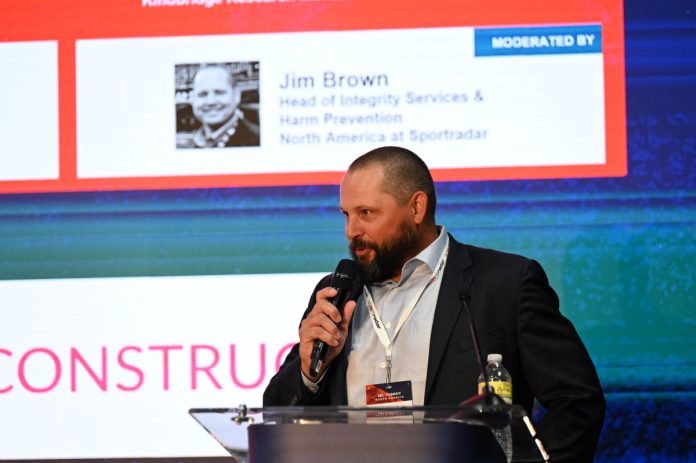Collaboration and proactive education initiatives around the potential risks of sports betting can help form the basis of a holistic athlete wellbeing program, according to Jim Brown, Sportradar’s Head of Integrity Services & Athlete Wellbeing for North America.
Announcing the launch of the Athlete Wellbeing Program at SBC Summit North America, Brown began by giving an overview of what the educational initiative will entail, highlighting the importance of providing an all-encompassing support service for athletes and the duty on stakeholders to maintain high standards of player protection.
He said: “So the Athlete Wellbeing Program is about how we provide education-based material to our league, federation, and governing body partners so that they can educate their athletes about the potential impact that sports betting may have on their mental health of the athletes.
“With over half of the states in the US now having access to legalized sports betting, these are some of the considerations that we should provide to the marketplace as responsible stakeholders.”
The program, Brown explained, has been in the works for quite some time with the Sportradar team finetuning their approach to athletes’ wellbeing over the course of this year.
Placing mental health and wellness at the forefront of its mantra, Brown believes that the initiative will form the perfect complement to the other products within the Sportradar Integrity Services’ product portfolio.
He added: “With my background, one of the things that I have been focused on for years now is how markets emerge and develop further. As we’re seeing in the US, a growing portion of the population can now bet legally so now is the proper time to truly consider how we support those leagues and sports bodies and how they subsequently support their athletes’ wellbeing.
“This program is one that we’ve been developing throughout the year, so the timing to launch this now has been perfect. It aligns perfectly with the rest of our integrity services products too.”
When announcing the program, Sportradar explained that through strategic partnerships that form the basis of the new Athlete Wellbeing program, a number of safer gambling stalwarts will be providing their expertise and guidance on providing mental health support to athletes.
This includes Kindbridge Behavioral Health, a mental health treatment provider focused on gambling and gaming disorders, Dr. Timothy Fong, Co-Director of the UCLA Gambling Studies Program, and Brianne Doura-Schawohl, a recognized expert in harm prevention and responsible gambling as well as the National Council on Problem Gambling.
“Programs like these will provide resources to our league partners and to sports bodies so that they can educate their athletes. This is really the start of how the industry can become more of a responsible stakeholder and how companies like Sportradar can provide support to the broader sports betting ecosystem.
“We wanted to make sure that we had fact-based education materials, supported by academic research and studies. So we went and partnered with those who specialize in athletes’ mental health and experts in the responsible gambling field.
“The initial rollout of the program is in October, which will be a very comprehensive offering. So following on that will be additional services that we provide to our partners that they can then take and expand on.”
Something which was underlined as being of great importance was the educational aspect of the program and the collaborative approach that Sportradar will be taking both with its program partner leagues as well as the leagues and sports bodies it plans to support.
By doing this, the Athlete Wellbeing Program can deliver a more holistic approach. Brown continued: “I think there are several ways forward when it comes to supporting athlete mental health and responsible gambling efforts. One of them is education, which is a much more proactive part of it. The more knowledge, education, and information that you can share with the leagues and other stakeholders, the better. It means that athletes can then be much more aware of what the industry looks like, what sports betting is and the potential risks that it can pose.
“As part of our broader integrity services, we do a lot to combat match-fixing which is a great complement to athlete wellbeing. Part of that is looking at how athletes engage in gambling in a responsible manner. For athletes, it’s multi-faceted right? Sometimes they participate in competitions that are betting-focused. Sometimes there may be bets on specific actions which may lead to them to engaging in gambling as well. So, the responsible gambling component is identifying what are the healthy and unhealthy behaviors as athletes engage in sports betting.
“Every league has a unique policy as to how it addresses their athletes and the ways in which they participate in sports betting. But we will set up education resources for these leagues which can be complementary to their own education initiatives.
“The sports betting industry can educate athletes on the things which are within our remit to – whether that’s problem gambling, anti-match fixing, integrity. By working together, it creates a more comprehensive education offering.”













